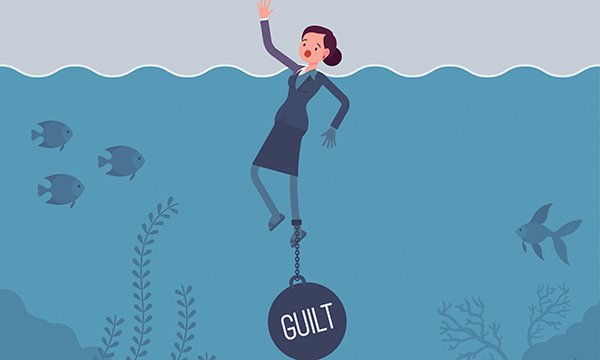Guilt is a complex emotion that can be challenging to deal with. It can arise from a variety of situations, such as making a mistake, behaving in a way that violates our moral code, or failing to live up to our expectations. Guilt can be a useful emotion as it can motivate us to correct our behavior and make amends. However, excessive or prolonged feelings of guilt can be detrimental to our mental health and wellbeing. In this article, we will explore the psychology of guilt and provide strategies for overcoming it.
The Psychology of Guilt
Guilt is a common emotion experienced by individuals across cultures and ages. It is often described as an unpleasant feeling that arises when one believes they have done something wrong. Guilt can result from real or perceived transgressions and can be experienced in varying degrees of intensity. Some individuals may feel fleeting moments of guilt, while others may experience intense and prolonged feelings of guilt that can significantly impact their mental health.
The origins of guilt can be traced back to evolutionary psychology. According to this theory, guilt has developed as a means of regulating social behavior. It is a mechanism that helps individuals conform to societal norms and expectations. When an individual violates these norms, they may feel guilt, which serves as a reminder to correct their behavior and maintain social harmony.
However, the experience of guilt is not solely determined by social norms. Our own internal values and beliefs play a significant role in shaping our experiences of guilt. When we behave in a way that is contrary to our beliefs or values, we may experience guilt. For example, if an individual believes in the importance of honesty and integrity but tells a lie, they may feel guilt as they have acted in a way that goes against their values.
Additionally, the experience of guilt is influenced by cognitive processes such as attribution and appraisal. Attribution refers to the explanations individuals make about their behavior. If an individual attributes their behavior to external factors such as circumstances or other people, they may experience less guilt. However, if they attribute their behavior to internal factors such as personality or character, they may experience more guilt.
Appraisal refers to the way individuals evaluate their behavior. If they believe their behavior has caused harm or has violated their moral code, they are more likely to experience guilt. In contrast, if they believe their behavior was justified or necessary, they may experience less guilt.
The Impact of Guilt on Mental Health
While guilt can serve a useful purpose in regulating social behavior, excessive or prolonged feelings of guilt can be detrimental to mental health. Guilt can lead to negative emotions such as anxiety, depression, and shame. It can also lead to cognitive distortions such as negative self-talk, rumination, and self-blame.
Rumination, in particular, is a common cognitive distortion associated with guilt. It refers to the repetitive and obsessive thinking about the situation that caused the guilt. This type of thinking can be unproductive and can exacerbate feelings of guilt, leading to a cycle of negative emotions.
Self-blame is another cognitive distortion associated with guilt. Individuals who experience guilt may blame themselves for their behavior, even if it was not entirely their fault. This type of thinking can be damaging to self-esteem and can lead to a negative self-image.
Strategies for Overcoming Guilt

Overcoming feelings of guilt can be challenging, but it is essential for maintaining mental health and wellbeing. The following strategies can help individuals overcome guilt and move forward.
Accept Responsibility and Make Amends
Accepting responsibility for our actions is the first step in overcoming guilt. It is essential to acknowledge the harm caused by our behavior and take steps to make amends. Making amends can include apologizing, repairing any damage caused, and taking steps to ensure the behavior does not occur again.
Practice Self-Compassion
Self-compassion is a crucial component of overcoming guilt. It involves treating oneself with the same kindness and understanding that one would offer to a friend. Practicing self-compassion can help individuals be more forgiving of their mistakes and reduce feelings of shame and self-blame.
Challenge Negative Self-Talk
Negative self-talk is a common cognitive distortion associated with guilt. It can exacerbate feelings of guilt and lead to a negative self-image. Challenging negative self-talk involves questioning the accuracy of our thoughts and replacing them with more realistic and positive ones. This can help individuals reframe their thoughts and reduce feelings of guilt.
Seek Social Support
Seeking social support can be beneficial in overcoming guilt. Talking to a trusted friend or family member can provide a fresh perspective on the situation and help individuals process their emotions. Additionally, seeking professional help from a therapist can provide a safe and supportive environment for exploring and addressing feelings of guilt.
Engage in Self-Care Activities
Engaging in self-care activities can help individuals manage their emotions and reduce feelings of guilt. This can include activities such as exercise, meditation, spending time in nature, or engaging in hobbies. Taking care of oneself can help individuals feel more balanced and better equipped to handle difficult emotions such as guilt.
In Conclusion to this we can say, Guilt is a complex emotion that can be challenging to deal with. While it can serve a useful purpose in regulating social behavior, excessive or prolonged feelings of guilt can be detrimental to mental health and wellbeing. Overcoming guilt involves accepting responsibility for our actions, practicing self-compassion, challenging negative self-talk, seeking social support, and engaging in self-care activities. By taking these steps, individuals can learn to manage their guilt and move forward in a positive and healthy way

